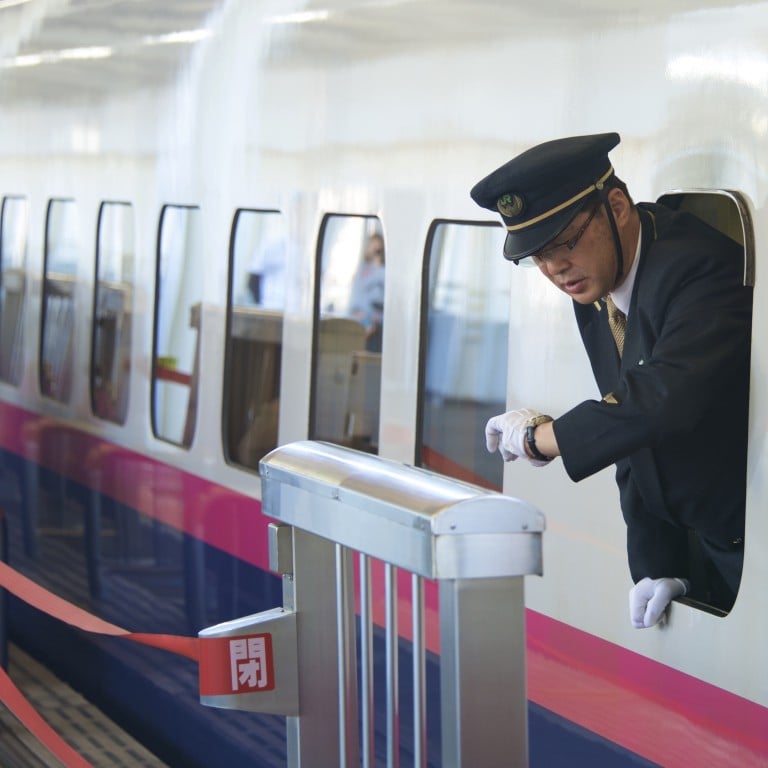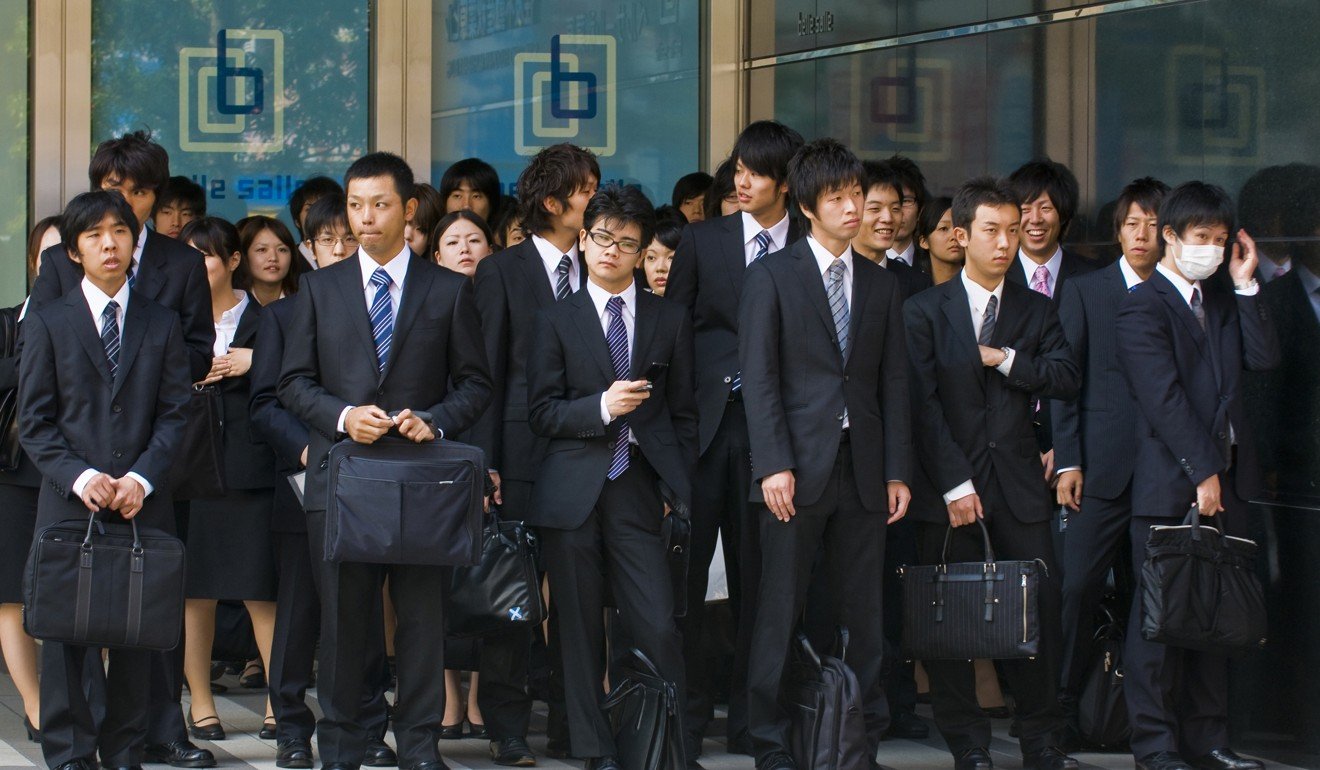
Why is Japan so obsessed with being on time?
- In a country where being late by seconds can spark a scandal, the pressure to be punctual is too much for some
- Firms are discovering punctuality doesn’t always equal efficiency
Last month, Japan was rocked by a scandal – the nation’s Olympics minister, Yoshitaka Sakurada, had the temerity to arrive three minutes late to a parliamentary meeting. The opposition staged a five-hour protest in response to Sakurada’s tardiness, while the public was outraged. Days later, he was forced to apologise.
It’s not just high-profile public figures. For business operators, institutions and work-related functions, arriving on time is of the utmost importance in Japan.
Japan defends it, India ignores it. In Asia, time really is relative
“The great inconvenience we placed upon our customers was truly inexcusable,” the firm said.

From a young age, the Japanese are taught the need to be on time.
“My parents always told me that it was important not to be late, to think about the people that I would inconvenience if I was even a little bit behind schedule, and I think that has sunk in,” said Issei Izawa, a 19-year-old university student.
Japanese worker’s pay docked for taking lunch 3 minutes early
Kanako Hosomura, a 35-year-old housewife living in Saitama prefecture, said she hated being late – even if it was only by a minute.
“I much prefer to be early to an appointment because it is better for me to wait than to make someone wait for me,” she said, adding that she would not stay friends with someone who arrived late and inconvenienced others.
But for many, this cultural emphasis on punctuality can be stressful. “My girlfriend works at a call centre for JR Railways. Last week, she returned from going on break and the supervisor said ‘You’re 10 seconds late’,” said a man who asked not to be named, adding that his partner was ultimately given a warning for her lateness. “It’s so extreme,” he said.
Japan’s obsession with being on time is often viewed by visitors with some measure of amusement – it is often framed as one of the nation’s greatest quirks. But, in truth, tardiness in the workplace has a real impact on the economy.
Even Japan’s famously polite commuters lose their cool sometimes
In Britain, late workers cost the economy up to £9 billion (US$11.7 billion), according to a 2017 Heathrow Express report. Over half of the people surveyed in the report said they arrived late to work and meetings on a regular basis.
In the United States, lateness takes a major toll as well. In the state of New York, tardy workers cost the region US$700 million a year; in California, workers arriving late cost their state more than US$1 billion annually, according to a 2018 report by Inc magazine.
But Japan wasn’t always such a stickler with time – until the late 1800s, pre-industrial Japan had a much more relaxed attitude. Willem Huyssen van Kattendijke, a Dutch naval officer who came to the country in the 1850s, wrote in his diary that the locals were never on time. “The idleness of the Japanese is quite astonishing,” he stated. At the time, trains often ran up to 20 minutes behind schedule.
If Singapore’s metro is improving, why the delays?
During the Meiji Restoration (1868-1912), during which the Emperor Meiji abolished the feudal system and implemented crucial military reforms and industrialisation, punctuality became a cultural norm, according to a 2008 paper in the East Asian Science, Technology and Society journal published by Duke University.
The trait was seen as a key tenet for the country’s progress from an agrarian to an industrialised modern society.
Schools, factories and railways – where punctuality were strictly enforced – were the major institutions that spearheaded this social change. Factories adopted Taylorism, a factory management system that economised efficiency and labour productivity by creating assembly lines and conveyor belts.
Shinkansen: India and Japan’s silver bullet for a rising China
Around this time, watches became popular items, and the concept of the 24-hour day became familiar to regular citizens. Most of all, according to time researcher Ichiro Oda, this was when the Japanese realised “time is money”.
By the 1920s, punctuality was enshrined in the country’s propaganda.
How-to lifestyle posters were prominently displayed with guides for women to create hairstyles in five minutes for a quick fix, and up to 55 minutes for formal occasions.
Since then, punctuality has since become linked to productivity in companies and organisations, said Makoto Watanabe, associate professor of communications and media at Hokkaido Bunkyo University. “If workers are late, the company and the group are going to suffer,” he said. “Personally speaking, if I’m not on time, I can’t get all the things that I need to do completed.”
It is important for company workers to present themselves as disciplined and punctual, said Mieko Nakabayashi, a professor of social sciences at Waseda University and a former lawmaker with the Democratic Party of Japan.
“If you can’t do that, then you very quickly get a bad reputation within the company,” she said.
But, as she explains, punctuality doesn’t always equal efficiency.

In 1990, tragedy struck in Hyogo prefecture when a 15-year-old student was crushed to death by the gates of her high school when she attempted to slip through them just as they began to close at 8.30am.
The teacher who pushed the button for the gates to close was fired, and the incident sparked much public debate at the time.
“Back in the day, it was very common to close the gate on time, and punish late students by making them run a lap or two,” said Yukio Kodata, 33, a Japanese-Canadian man who has lived and worked in Japan, where late records on a student’s transcript can affect their chances of getting into university.
Nor does punctuality make up for the high level of inefficiency in Japanese companies and organisations.
“Meetings go on for much too long, most people don’t actually contribute anything of use, there is repetition of tasks. And being at your desk at 9am makes no real difference to the big picture,” said Mieko from Waseda University, remarking on the fact that most companies require employees to work over 80 hours of unpaid overtime each month, according to a 2016 report.
Overtime endemic in Japanese ministry tackling death from overwork
Ultimately, the emphasis on punctuality and lack of boundaries for overtime work affect the quality of life, said Kodata, the Japanese-Canadian.
“In Japan people have the mentality that if everyone else is doing it, they have to do it too. You’re basically stuck,” he said. “For a lot of my friends who come to Canada from Japan, they never want to go back. They like Japan for the entertainment and food, but they won’t want to go back and work there.
“It’s funny because here in Canada, if you’re off at 5pm – it’s ‘peace out, see you later’. But not in Japan.” ■


